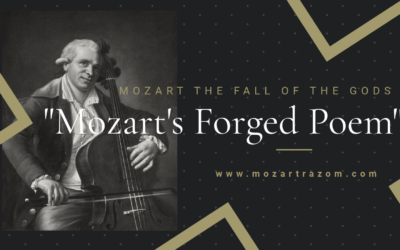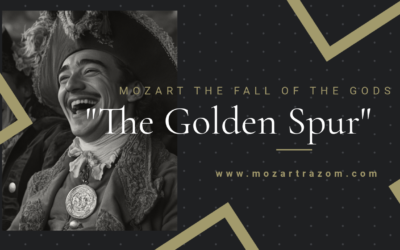Leopold Mozart’s Fabricated Legacy
The False Sonnet of Corilla Olimpica
Leopold Mozart’s relentless pursuit of fame for his son Wolfgang led to questionable tactics, including fabricating a sonnet by the renowned poetess Corilla Olimpica. This desperate attempt to elevate Wolfgang’s reputation casts a shadow over the Mozart legacy.
Mozart: The Fall of the Gods
This book offers a fresh and critical look at the life of Wolfgang Amadeus Mozart, challenging the myths that have surrounded him for centuries. We strip away the romanticised image of the “natural genius” and delve into the contradictions within Mozart’s extensive biographies. Backed by nearly 2,000 meticulously sourced citations, this work invites readers to explore a deeper, more complex understanding of Mozart. Perfect for those who wish to question the traditional narrative, this biography is a must-read for serious music lovers and historians.
"Leopold Mozart's false claim that Corilla Olimpica wrote a sonnet for Wolfgang was not just a father’s exaggeration—it was a deliberate fabrication to manufacture a legacy that never existed."
@MozartrazoM
One of the most infamous examples of Leopold Mozart’s manipulative behaviour during Wolfgang’s Italian tour in 1770 involves the celebrated poetess Maria Maddalena Morelli Fernandez, better known as Corilla Olimpica. According to Leopold’s letters, Corilla supposedly composed a sonnet in honour of Wolfgang, delivered by the English violinist Thomas Linley. However, this story is full of glaring inconsistencies, pointing to a deliberate fabrication by Leopold in his effort to promote his son.
Corilla was a respected figure in the Florentine cultural scene, renowned for her eloquent poetry. Yet, the so-called sonnet Da poi che il Fato t’ha da me diviso, supposedly dedicated to Wolfgang, is riddled with grammatical errors and lacks any reference to Mozart’s actual musical talents. Its generic content could have been directed at anyone, making it highly unlikely that Corilla, known for her precision, would have penned such a lacklustre piece.
More damning is the fact that Corilla herself never mentioned writing any poem for Mozart, nor did Linley, the alleged intermediary. The complete absence of this event from contemporary records and Corilla’s own writings strongly suggests that Leopold invented the entire episode. It seems that Leopold, ever the ambitious stage father, was willing to bend the truth to construct a narrative that would further glorify his son. By associating Wolfgang with prominent cultural figures like Corilla, Leopold hoped to boost his son’s status in the eyes of the aristocracy and potential patrons.
Leopold’s need to fabricate this sonnet speaks volumes about the lengths he was willing to go. Far from being an innocent promoter of his son’s talent, he consistently manipulated events and exaggerated Wolfgang’s achievements. The supposed involvement of Corilla Olimpica in Mozart’s early career is yet another instance of Leopold’s unscrupulous methods to establish his son’s reputation, even at the cost of truth.
The reality is that Corilla, at the time, was far more focused on her relationship with the violinist Pietro Nardini, not on some adolescent prodigy passing through Florence. Leopold’s fabrication reveals a deep insecurity about his son’s place in the musical world, and this episode casts serious doubt on the authenticity of many accounts from Wolfgang’s early career.
You May Also Like
#3 Leopold Mozart’s Literary Theft
Hidden within the Mozarteum’s archives lies a poem that has long been hailed as a tribute to the young Mozart children. But behind this innocent façade is a story of deception, literary theft, and one father’s ambition to rewrite history.
#4 The Golden Spur
While often portrayed as a prestigious award, the Golden Spur (Speron d’Oro) granted to Mozart in 1770 was far from a reflection of his musical genius. In this article, we delve into the true story behind this now-forgotten honour, its loss of value, and the role of Leopold Mozart’s ambitions in securing it.
Mozart Unmasked: The Untold Story of His Italian Years
Explore the lesser-known side of Wolfgang Amadé Mozart’s early years in Italy. ‘Mozart in Italy’ unveils the complexities, controversies, and hidden truths behind his formative experiences, guided by meticulous research and rare historical documents. Delve into a story that challenges the traditional narrative and offers a fresh perspective on one of history’s most enigmatic composers.
Another Example of Borrowed Genius
The myth of Mozart’s genius continues to collapse under the weight of his reliance on others’ ideas, with Leopold orchestrating his son’s supposed early brilliance.
A Genius or a Patchwork?
The genius of Mozart had yet to bloom, despite the anecdotes passed down to us. These concertos were not the work of a prodigy, but a collaborative effort between father and son, built on the music of others.
Myth, Reality, and the Hand of Martini
Mozart handed over Martini’s Antiphon, not his own, avoiding what could have been an embarrassing failure. The young prodigy had a lot to learn, and much of what followed was myth-making at its finest.







